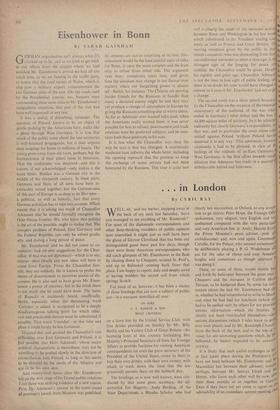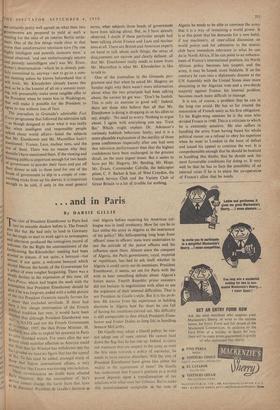. . . in London
By CYRIL RAY WELL, sir,' said my barber, snipping away at the back of my neck last Saturday, 'have you managed to see anything of Mr. Roosevelt?' For most of the diplomatic correspondents and other deep-thinking moulders of public opinion here assembled it might just as well have been the ghost of Grover Cleveland that has been our distinguished guest these past few days,. though there were those American correspondents who did catch glimpses of Mr. Eisenhower in the flesh by chasing down to Chequers, around St. Paul's, and up to Balmoral—coming back from that place, I am happy to report, duly and deeply awed at having trodden the sacred soil from which springs Scotch.
For most of us, however, it has been a matter of those briefings that ,are now a subject of public jest—in a marquee stencilled all over :
ON HIRE C. F. BARKER & SON WEST CROYDON
on a lawn lent by the United Service Club, with free drinks provided on Sunday by Mr. Billy Butlin and his Variety Club of Great Britain—the licensing laws of this country forbidding Her Majesty's Principal Secretary of State for Foreign Affairs to provide facilities for visiting American correspondents (or even the press secretary of the President of the United States:come to that) to buy their own drinks, with their own money, with which to wash down the food that the law graciously permits them on the Sabbath day.
The briefings, as is now well known, were con- ducted by that same press secretary, the al(- powerful Jim Hagerty; Andy Berding, of the State Department, a Rhodes Scholar who had clearly not succumbed, in Oxford, to any tempts' tion to go native; Peter Hope, the Foreign 011V spokesman, very elegant, very English and yeti' sunburned compared with the very pasty-facto and very American Jim 'n' Andy; Harold Evatl' the Prime Minister's press adviser, pink ailcj archidiaconal; and, now and again, Commander Colville, for the Palace, who seemed sometimes 0 be deliberately playing a P. G. Wodehouse ass for the sake of cheap- and easy Ameriet0 laughs, and sometimes as though unaware 111 was doing it. These, or some of these, would shuttle bttel and forth by helicopter between 'the great men 01 Chequers and the marquee in Carlton Hod Terrace, to be badgered there by some for info(' illation about the bed Mr. Eisenhower had slet. in, whether he had remembered to write to Maali and what he had had for luncheon (which 10 had to be spelled out); by others tor not providil serious information—which the brjefers clearly not been 'vouchsafed themselves,--ab0 serious discussions (which I take leave to dOtt ever took place); and by Mr. Randolph Church',.: from the back of the tent, and at the top of 0 voice, for not answering questions which, he the°. bellowed, he hadn't expected to be answere anyway. It is likely that such useful exchanges as hilvf.t in fact taken place during_ the President's ,'tit have not been between Mr. Eisenhower and 10c. Macmillan but between their advisers;notall perhaps, between Mr. Selwyn Lloyd and rsif Herter, who know each other well by now, after their three months or so together in Geneva Even if they have not yet come to agree 010 advisability of an immediate summit meeting, .111e1 are certainly pretty well agreed on what their two It governments are prepared to yield at such a Meeting for the sake of an interim Berlin settle- ment. One of the few things made clear in that Worse than uninformative television turn (`by one highly intelligent and patently insincere man,' a friend observed, 'and one embarrassingly sincere and patently unintelligent one') was Mr. Eisen- hower's determination—which he is already pub- licly committed to, anyway—not to go to a sum- mit meeting unless he knows beforehand that it Will work. Mr. Khrushchev already knows this and, as he is the keenest of all on a summit meet- ing, will presumably make some tangible offer to the President when he meets him in Washington, that will make it possible for the President to agree to one without loss of face.
The journalists in Granada's admirable Fast F"clis programme that followed the television talk though designed to show what it was really like when intelligent and responsible people talked about world affairs—listed the subjects that Mr. Eisenhower and Mr. Macmillan hadn't Mentioned : France, Laos, nuclear tests, and the rest of them. There was no reason why they shouldn't have mentioned them. If the viewing and listening public is important enough for two heads of government to powder their faces and put off their dinner to talk to them (and for one of the heads of government to slip in a couple of vote- catching tricks from up his sleeve), it is important enough to be told, if only in the. most general
ci ;r1
11 It
It nl
.e lot
nr n. vet Ibt
terms, what subjects those heads of government have been talking about. But, as I have already observed, I doubt if these particular people had been talking about France and Laos and nuclear tests at all. There are British and American experts on hand to talk about such things; the areas of disat,reement are narrow and clearly defined; all that Mr. Eisenhower really needs to know from Mr. Macmillan is what Mr. Khrushchev is like to talk to.
One of the journalists in the Granada pro- gramme said that when he asked Mr. Hagerty on Sunday night why there wasn't more information about what the two principals had been talking about, the answer he got was: 'Don't be foolish. This is only an exercise in good will.' Indeed, there are those who believe that all that Mr. Eisenhower is doing is dropping in on his allies to say, simply: `No need to worry. Nothing to argue about. I agree with everything you say. Trust Ike.' Which might explain Dr. Adenauer's curiously bobbish behaviour lately; and it is a more plausible explanation of the sterility of those press conferences (especially after one had seen that television performance) than that the highest confidences have been exchanged, in the greatest detail, on the most urgent issues. But it seems to have put Mr. Hagerty, Mr. Berding, Mr. Hope, Mr. Evans, Commander Colville, the helicopter pilots, C. F. Barker & Son, of West Croydon, the United Service Club and the Variety Club of Great Britain to a lot of trouble for nothing.



































 Previous page
Previous page